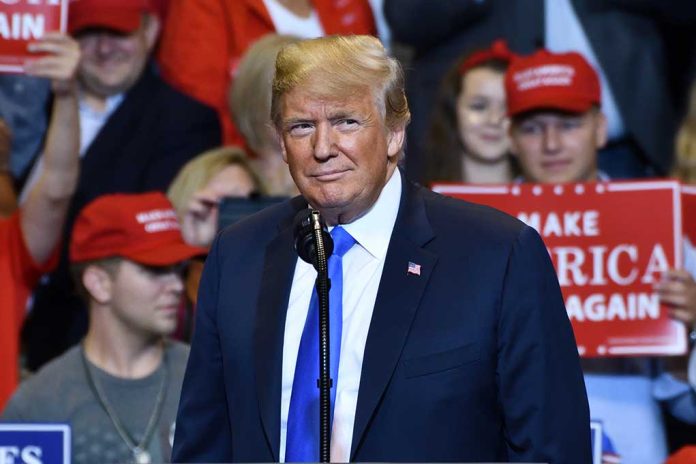
President Trump’s efficiency task force terminates over 25,000 federal contracts, saving American taxpayers $175 billion and striking a decisive blow against wasteful government spending.
Key Takeaways
- The Department of Government Efficiency (DOGE) has canceled 10,871 government contracts, 15,149 grants, and 494 leases, saving approximately $1,056 per U.S. taxpayer.
- Significant savings came from the Department of Health and Human Services, General Services Administration, Education Department, Office of Personnel Management, and Department of Labor.
- A major cleanup of Social Security records identified 12.3 million people aged 120 or older as deceased, eliminating potential fraud.
- Democratic lawmakers have criticized DOGE, claiming it’s illegally blocking $400 billion in congressionally appropriated funds.
- Elon Musk, who initially advised DOGE, has returned to focus on his businesses while maintaining an advisory role in the efficiency initiative.
Trump’s DOGE Initiative Slashes Federal Waste
The Department of Government Efficiency (DOGE), established by President Donald Trump in January to combat fraud, waste, and abuse in the federal government, has achieved remarkable success in its mission. The task force reports terminating over 25,000 federal contracts and grants, resulting in approximately $175 billion in savings for American taxpayers. This impressive figure translates to about $1,056 per U.S. taxpayer, demonstrating the administration’s commitment to fiscal responsibility and efficient governance that prioritizes American citizens’ hard-earned money.
The terminations include 10,871 government contracts, 15,149 grants, and 494 leases across various federal departments. Most recently, DOGE canceled 81 “wasteful contracts” valued at $368 million, saving roughly $244 million. These decisive actions represent a significant departure from previous administrations’ approach to federal spending and demonstrate Trump’s business-minded approach to government operations. The initiative particularly targets departments with histories of bloated budgets and questionable spending practices.
Major Savings Across Key Departments
The efficiency initiative has achieved its most substantial savings in several key federal departments. The Department of Health and Human Services, General Services Administration, Education Department, Office of Personnel Management, and Department of Labor have all seen significant contract terminations and budget reductions. These departments have long been criticized by conservatives for excessive spending and inefficient operations that fail to deliver meaningful results for American taxpayers while growing government bureaucracy.
“The DOGE team has done incredible work, but the magnitude of the savings is proportionate to the support we get from Congress and from the executive branch of the government in general,” said Elon Musk.
In addition to contract terminations, DOGE conducted a major cleanup of Social Security records, marking 12.3 million people aged 120 or older as deceased. This critical update addresses potential fraud vulnerabilities in the system that have persisted for decades, preventing possible exploitation by those seeking to collect benefits fraudulently. The initiative demonstrates how basic administrative improvements can protect taxpayer funds from waste and abuse that previous administrations have neglected.
Elon Musk’s Advisory Role
Elon Musk, who initially helped shape DOGE’s strategy, has returned to focus on his business ventures while maintaining an advisory position with the government efficiency team. Musk’s business acumen and innovative approach to problem-solving helped establish the foundation for DOGE’s ambitious goals, including the aspiration to achieve $1 trillion in federal spending cuts through comprehensive audits of government operations and expenditures.
“Back to spending 24/7 at work and sleeping in conference/server/factory rooms. I must be super focused on X/xAI and Tesla (plus Starship launch next week), as we have critical technologies rolling out,” said Elon Musk.
Despite scaling back his direct involvement, Musk has clarified his role in the initiative. “We’re not the dictators of the government. We are the advisers. And so we can advise, and the progress we’ve made thus far, I think, is incredible,” Musk stated. This pragmatic approach allows DOGE to benefit from private sector expertise while maintaining appropriate boundaries between government functions and business interests as the initiative continues its important work.
Democrat Opposition to Fiscal Responsibility
Despite the clear benefits to American taxpayers, DOGE faces opposition from Democrat lawmakers who have criticized the initiative for allegedly blocking $400 billion in federal funds appropriated by Congress. This resistance highlights the fundamental divide between conservative principles of fiscal responsibility and the left’s preference for unchecked government spending. Democrats claim DOGE’s actions constitute an illegal funding freeze that harms Americans, while supporters counter that eliminating waste benefits all citizens through reduced national debt and more efficient government.
DOGE has also encountered legal challenges, including a court case limiting access to Social Security records, with the Trump administration appealing to the Supreme Court. These obstacles reflect the entrenched resistance to meaningful reform within the federal bureaucracy and from those who benefit from wasteful government spending. Nevertheless, the administration remains committed to its efficiency goals and continues to identify opportunities for savings across all federal departments.
The remarkable success of DOGE in its early months demonstrates the potential for substantial reductions in federal spending without compromising essential government functions. By focusing on eliminating waste, fraud, and abuse rather than blindly cutting services, the Trump administration has found a formula for more responsible governance that respects taxpayers while maintaining necessary government operations. The initiative represents a significant step toward the fiscal discipline that conservatives have long advocated.







